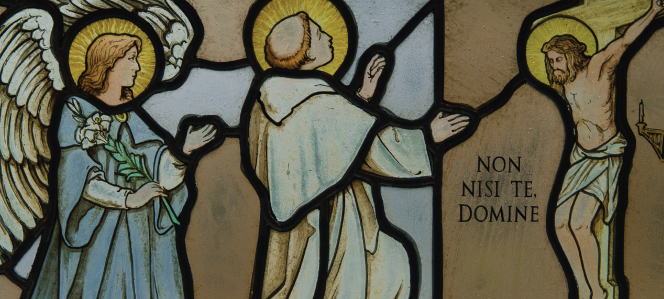One day in the thirteenth century a Dominican friar named Br. Dominic of Caserta, a sacristan, concealed himself in his priory chapel in Naples. While there, he stealthily observed St. Thomas Aquinas in prayer before the crucifix, in tears. No doubt, the saint’s reverence must have moved him deeply, but, nonetheless, he must have been quite surprised when, suddenly, the voice of Christ from the crucifix called out, “You have written well of me, Thomas. What reward will you receive from me for your labor?”
One can certainly imagine Br. Dominic waiting with bated breath for an answer from the man often regarded as the greatest theologian of the Middle Ages. A saintly man, certainly he would not ask for wealth or power for himself. Perhaps inspiration for excellent argumentation with which to confute the heretics? Favorable reception of his work within the Church (the subject of great controversy, even after his death)? How about simply an increase in virtue? Doubtless, when Jesus speaks audibly from the cross, he really means it. So what does Friar Thomas ask?
His response wasted no words: Domine, non nisi Te—that is, “Lord, nothing except you.”
Does such a prayer not contain all others?
Thomas’ prayer may suggest that, in his holiness, he managed to suppress all earthly want. This suggests that the goal of Christian life consists of a continual effort to squeeze out all our natural desires so that all that remains is to be holy. But when God became man, he redeemed our humanity. Thomas, knowing this, communicates something more profound. By asking for nothing except God, he asks that everything in his life be ordered to God, that all works, all suffering, and all desire point ultimately to God. This ordering of life bestows a true freedom and happiness that the world cannot give. It is a freedom which sanctifies all desires and fulfills human nature.
As Christians, we easily forget this. Our lives are full of burdens difficult to bear and failures easy to regret. Too often, there results the lurking feeling deep inside that if we do not succeed, we will not be good enough, for our family, for our friends, for ourselves, or even for God. As a result, rather than expending our energies growing closer to God, we build walls around ourselves to maintain illusions of adequacy. In prayer, instead of receiving God’s love, we obsess about fixing our lives or the lives of those around us. Our disordered affections prevent our properly ordering even our best efforts to God. Instead of letting prayer animate our lives, we try to earn holiness by our work.
If the greatest theologian of the Middle Ages—so busy that he was said to dictate his brilliant treatises while sleeping; so controversial that King Louis IX’s archers had to guard his first lecture—found his repose in God alone, might we find just a little bit of encouragement?
Life presents three choices: to take the burden of life upon ourselves, to give up, or to give it up to God. The first will poison whatever we undertake with the best intentions as soon as we fall short, or need to hurt someone else to succeed. The second will give momentary repose as we slip into the dread of meaninglessness and furiously seek distractions to drown out our dying conscience. The third is a daunting enterprise, but will set us free.
Thomas did not ask for success or personal growth because he knew that we do not need to earn God’s love. He gives it freely. We only need to receive it. All good works flow from this. Plenty of saints have been, by many measures, failures. But they persevered, slowly growing in virtue and meeting the trials of life with only Jesus to support them. They witness to the fact that God did not create us for such a measly task as worldly success. He created us for love.
We are invited to immerse ourselves in an ocean, but instead, we often try to drink it. May the prayerful tears of St. Thomas remind us that we were made for nothing less than the love of God. This love awaits only our response.
